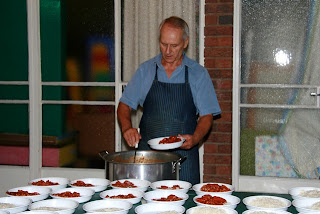
Get Involved: Youth in Action!
Are you a young person that is interested in making a difference in the world?
Join The Hunger Project (THP) in its mission of ending hunger and poverty, while building your leadership skills. Here are some ways you can participate:
•Hold a bake sale/educational event at your school or in your community to benefit THP. Each item that is sold could have a label attached to it with some important statistics and facts about world hunger.
•Hold a fundraising event through your school, camp, youth group, religious group, or sorority or fraternity. Events could include yard sales, read-a-thons, benefit concerts and more!
◦The women of Alpha Chi Omega sorority in Quinnipiac University held a fashion show and donated the proceeds to THP. Staci Sherman (right), sophomore, said: "We thought that of all the other organizations out there, we loved the idea of ending world hunger and empowering women and their families to stay healthy every day."
◦Seventh and eight grade students at East Palo Alto Middle School in California had a special philanthropy project to research and choose ten non-profits focused on the Millennium Development Goals (MDGs) to support. THP received one of the highest amounts of money: $1,700!
•End world hunger one grilled cheese at a time. FeelGood is an organization that was started in 2004 on the University of Texas campus as a grassroots effort to help provide solutions for an end to global hunger. Students distribute gourmet grilled cheese sandwiches in return for a donation, with all proceeds going to The Hunger Project. Participate in one of the FeelGood chapters on 27 campuses in the US and Mexico OR start a FeelGood chapter on your own campus. Visit their website.
•Help us reach out! Do a school and community drive to encourage people to sign up for THP's email list. Learn and share some basics about world hunger and THP and collect new members for our list.
•Run a Penny Harvest campaign. If your school partners with Penny Harvest, share about world hunger and THP with your friends and start/join a roundtable that will contribute to THP!
◦If your school is not yet a Penny Harvest partner, learn more about how to join! Since 1991, children between the ages of four and 14 have been converting their natural compassion for others into action by collecting pennies and turning those pennies into grants for community organizations.
◦In June 2009, two New York City schools participating in Penny Harvest collected more than $1,000 for THP! (Photo is Emma, Katrina and Casey from the Penny CAKES roundtable at P.S. 144 in Queens, NY with staff member Anastasia Andrzejewski)
•Dine at home instead of going out for dinner, ice cream or whatever with friends, and send money you would have spent to THP.
•Start a coin collection campaign for THP in stores in your neighborhood. Decorate a "coin can" and share about how important ending hunger is and that every penny counts.
•Write and put on a play. Help educate others about what hunger and poverty are like in the developing world by writing and putting on a play. A small admission fee could be charged with the proceeds going to THP.
For materials, more information, hunger facts and help in putting any of the above ideas into action, contact Anastasia Andrzejewski at aha@thp.org! If you have any more ideas, share them!



.jpg)


.jpg)
.jpg)




.jpg)
.jpg)










